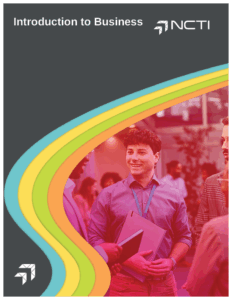Delivery: Online + Textbook |
College Credit: 3 Credit Hours |
Est. Length: 34 Seat Hours
Price: $930.00

Course Overview
The NCTI Introduction to Business course bridges the gap between technical expertise and corporate strategy. Designed for current and aspiring leaders, this course combines traditional business theory with broadband industry-specific case studies.
To succeed in the modern cable industry, leaders must understand how the gears of business turn together. This comprehensive curriculum explores every facet of the organization: from Strategic Management and Global Economics to the nuances of Labor Relations and Financial Accounting. Students will learn to navigate the external environment, implement ethical social responsibility programs, and optimize supply chains—positioning themselves to make smarter financial and operational decisions.
Who Should Attend:
- Technical Leaders transitioning to Management
- Financial Decision-Makers
- Aspiring Operations Managers
- Non-technical staff requiring industry context
What You Will Learn
Upon completion, students will be uniquely positioned to manage the critical components of a broadband business, from human resources to financial reporting.
Core Competencies:
- Strategic Environment: Analyze the U.S. business system, global economic contexts, and the impact of international trade barriers.
- Management & HR: Differentiate between management styles, lead diverse teams, and navigate Human Resource (HR) challenges including collective bargaining and compensation.
- Financial Literacy: Interpret Financial Statements, understand the role of the Federal Reserve, and manage capital growth through securities and investments.
- Operations & Quality: Implement Operations Management strategies to create value, improve quality (TQM), and optimize the supply chain.
- Marketing Mix: Define target markets, understand consumer behavior, and manage the Product Life Cycle from development to distribution.
- Ethics & IT: Apply ethical decision-making frameworks and protect the business from Information Technology (IT) threats.
Certification and Benefits
Business Acumen for the Technical World
This course offers significant academic value, providing 3 hours of college credit while delivering the practical business knowledge needed for everyday decision-making.
Additional Benefits:
- Industry Recognition: Receive the NCTI Certificate of Graduation.
- Holistic Perspective: Understand how marketing, finance, and operations interact to drive profitability in a broadband company.
- Leadership Skills: Learn strategies for enhancing employee job satisfaction and performance.
Course Outline
Module 1: The Business Environment
- Economic systems and the Global Context of business.
- Ethics: Social Responsibility and Government regulations.
- Entrepreneurship: New ventures, ownership structures, and corporations.
Module 2: Management and Organization
- Strategic Management: Goals, strategy, and crisis planning.
- HRM: Staffing, compensation, and labor relations.
- Leadership: Motivation theories and decision-making styles.
Module 3: Operations and Marketing
- Operations: Supply chain management and Quality Improvement.
- Marketing: Consumer behavior, product development, pricing, and promotion.
Module 4: Finance and Information
- IT: Managing risks and harnessing competitive power.
- Accounting: Financial statements, the Accounting Equation, and reporting standards.
- Finance: Banking, securities, and maximizing capital growth.
